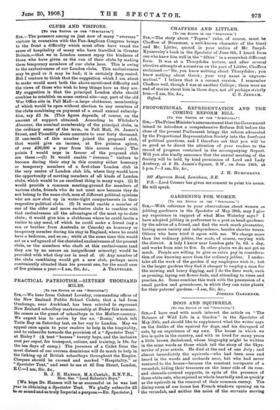CLUBS AND VISITORS.
[TO TIM EDITOR OP TRH • SPECTATOR."] SIR,—The presence among us just now of many " overseas " visitors in connexion with the Pan-Anglican Congress brings to the front a difficulty which must often have vexed the sense of hospitality of many who have travelled in Greater Britain,—that we in London cannot repay the kindness of those who have given us the run of their clubs by making them temporary members of our clubs here. This is owing to the exclusiveness of our London clubs. This exclusiveness may be good or it may be bad; it is certainly deep seated. But I venture to think that the suggestion which I am about to make would meet both the above-mentioned difficulty and the views of those who wish to keep things here as they are. My suggestion is that the principal London clubs should combine to establish on some central site—say, part of the old War Office site in Pall Mall—a large clubhouse, membership of which would be open without election to any members of the clubs combining on payment of a small annual subscrip- tion, say 58. (This figure depends, of course, on the amount of support obtained. According to Whitaker's Almanac, the nominal membership of the principal clubs, in the ordinary sense of the term, in Pall Mall, St. James's Street, and Piccadilly alone amounts to over forty thousand. If one-tenth of this number joined the proposed club, that would give an income, at five guineas apiece, of over £20,000 a year from this source alone.) The points I would urge in favour of the proposed club are these :—(1) It would enable " overseas " visitors to become during their stay in this country either honorary or temporary members of a first-class London club in the very centre of London club life, where they would have the opportunity of meeting members of all kinds of London clubs, which would be an excellent thing in many ways. (2) It would provide a common meeting-ground for members of various clubs, friends who do not meet now because they do not belong to the same club, men of different political opinions who are now shut up in water-tight compartments in their respective political clubs. (3) It would enable a member of one of the older and more exclusive clubs to combine with that exclusiveness all the advantages of the most up-to-date clubs ; it would give him a clubhouse where he could invite a visitor to any meal, of which he could make a friend (say a son or brother from Australia or Canada) an honorary or temporary member during his stay in England, where he could have a bedroom, and so on ; while at the same time this would act as a safeguard of the cherished exclusiveness of the present clubs, as the members who chafe at this exclusiveness (and they are by no means an insignificant minority) would be provided with what they are in need of. (4) Any member of the clubs combining would get a new club, perhaps more conveniently situated than his present one, for the small sum
of five guineas a year.—I am, Sir, &c., A TRAVELLER.










































 Previous page
Previous page